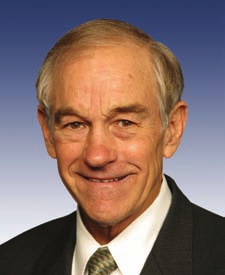 This is my fourth and final blog on presidential candidates. If events arise that justify it, I will address political matters in the future. But for now, this is it. Next week I’ll return to normal blogging, whatever that may bring. (Maybe something about Dietrich Bonhoeffer or C. S. Lewis, who I’ve been rereading lately.)
This is my fourth and final blog on presidential candidates. If events arise that justify it, I will address political matters in the future. But for now, this is it. Next week I’ll return to normal blogging, whatever that may bring. (Maybe something about Dietrich Bonhoeffer or C. S. Lewis, who I’ve been rereading lately.)
I said I’d comment on Ron Paul, the Texas congressman with libertarian ideals who is running for the Republican nomination. Dr. Paul has a very large financial base, and the most loyal and outspoken constituency on the Internet. He opposes abortion, and I greatly respect him for that.
Three weeks ago, after my first Mike Huckabee blog, a number of Ron Paul supporters encouraged me to check into him. I did so, going to his website and elsewhere. As with other candidates, I found the most helpful information by reading and listening to his words at the Values Voters Debate.
Despite my appreciation for his stand against abortion, and my impression that he is sincere and honest, I am concerned about a number of Ron Paul’s positions. For instance, regarding radical Islam and terrorism, he said:
We have to understand the motives of those who come here & kill us. If we don’t understand that, we are not going to win this fight. They come here and kill us because we occupy their lands, and they rationally reason [that] we have to do something about it.
This seems a naïve response. Like “they’re only defending themselves, and if we stay away from them, they won’t try to hurt us.” In contrast, Mike Huckabee responded,
The threat we face is one a lot of Americans don’t fully comprehend or understand. This isn’t a typical geo-political war. It’s a war against an enemy that has no national borders or boundaries. It’s a theological war. It’s not politically correct to say that. It’s just the truth. We are fighting people whose religious fanaticism will not be satisfied until every last one of us is dead, until our culture, our society, is completely obliterated from the face of the earth. It is the perfect marriage of religion & state, and that’s why it is so incredibly dangerous, more so than any enemy we face. And here’s the reality. War is about will. Whoever chooses to leave loses. We can’t afford to lose, because this is not a war about Iraq, it’s not a war about Afghanistan, it’s a war about our survival as a civilization and as a people, and every effort must be made to defend this great country against it.
At the debate, there was a series of questions in response to which every other candidate took the same position except Ron Paul (which would be to his credit, if they were all wrong and he was right). One related to endorsing attempts to protect Iraqi Christians under provisions in Iraq's existing constitution. Only Ron Paul said no to this.
I was moved when Bobby Schindler said to the candidates, “I’m with the Terry Schindler Schiavo Foundation. My beloved sister starved and dehydrated to death in a land of abundance, while the world watched—because she was disabled and unable to speak for herself. My question is, would you pursue or support legislation that would protect the cognitively disabled from being dehydrated to death by having their food and water taken away?”
Again, Ron Paul voted no. All the others voted yes.
Janet Folger, who was at the Summit, appraised Paul this way:
Here’s what I saw: While he’s been a courageous defender of the Constitution, Ron Paul had too many wrong answers at the Values Voter Debate to receive our support. Save your angry e-mails until you’ve seen the video of his podium lit “red” with “no votes” while everyone else voted “yes” to questions about whether they would protect disabled patients like Terri Schiavo from a starvation death, agree to prosecute all violators of the federal obscenity law, and support a trade policy with China contingent on improved human rights and quality standards.
Joe Glover of the Family Policy Network clarified it further when he asked Paul: “Many libertarians oppose laws against same-sex marriage, prostitution, and illegal drugs. Do you share this view?” His answer was “yes,” he’s a libertarian and doesn’t think the government has any business protecting marriage and human life.
Thomas Jefferson seems to disagree with Ron Paul when he said, “The care of human life and not its destruction is the first and onlylegitimate object of good government.”I respect Ron Paul’s courage in taking many minority opinions in Congress and at the Summit. I respect his commitment to stand by his principles, even when it’s unpopular. I would support him if I didn’t believe he’s wrong in a number of significant areas. I’m convinced the sanctity of human life must include not only the unborn, but other defenseless people (such as Terry Schiavo), beginning in our own country and extending to places where we at least have some influence on our international trade partners.
Why Bother with Politics?
So why have I, someone who doesn’t enjoy politics or follow them closely, taken the time to research and write four blogs on the candidates? Why do I even care? Here are perhaps my four best answers:


Yes, it was the end of a long day for my three oldest grandsons, Matthew Franklin, Ty Stump and his big brother Jake, who settled down on our bed to watch the always-exciting adventures of The Donut Man. Jack Franklin, our youngest grandson, was more bright-eyed. Visions of politics were not dancing in any of their heads.
I realize these precious children, and yours, are not going to grow up in a perfect society. And I know that politics aren’t the ultimate solution to anything. But I also know that the personal integrity and convictions and vision of those leading our country will have a real effect on the world in which these children live.
Having witnessed the profound moral decline and erosion of values and spiritual confusion in this culture in the fifty-three years I’ve been alive, and the thirty-five or so I’ve known Christ, I hope and pray for some kind of reversal, or at least some slow-down in the deterioration. Because if things continue as they have, these boys, by the time they are men, will be part of a society so heavy under the hand of God’s judgment that it might never turn back. (I’ve been feeling the weight of the beginnings of His judgment on our self-destructing culture for decades, but dare not presume upon His infinite patience.)
I do not assume, as many Christians appear to, that Christ will return to deliver us before things further deteriorate. Scripture nowhere promises that. Every decade since the 1960s there have been prophecy teachers convinced that the Lord will undoubtedly return within a few years (as a young Christian I believed them), but He has not yet obliged any of them.
I know Jesus will in fact return as King of Kings, and establish a new heavens and earth overflowing with righteousness (2 Peter 3:13). But that could be hundreds of years from now. Meanwhile our children and grandchildren and great-grandchildren will have to live in the society we leave them. If we have failed to bring Jesus to every corner of it we could—and to this point we certainly have failed—they will pay the price.
I don’t believe we should stand by passively and watch our culture go down the drain, imagining that ours is a “higher” spiritual calling. You know, like, “Why bother rearranging the furniture on the Titanic? It’s going down away, no matter what we do.”
Yes, the earth will be destroyed by fire (2 Peter 3), but we don’t know the timetable. God never withdrew His delegation for us to govern this earth, even under the fall and curse. Believers are to be salt and light, bringing Jesus to all the problems and needs of our culture.
I don’t want to stand before Christ and have to answer the question, “Why didn’t you do more to uphold me and my truths in the midst of that dying culture? If you had, perhaps I would have withheld judgment and brought transformation and healing.”
That’s why I bother with politics, without putting undue trust in them. It may not be much, but I owe it to my Lord, and to my children and grandchildren and great-grandchildren, to do what I reasonably can.
Meanwhile, regardless of where America or western civilization goes, may we as God’s people devote ourselves to passing on to our families what they so desperately need, that they may love our Savior in this broken world, for God’s glory and their good:
We will not hide them from their children; we will tell the next generation the praiseworthy deeds of the LORD, his power, and the wonders he has done….which he commanded our forefathers to teach their children, so the next generation would know them, even the children yet to be born, and they in turn would tell their children. Then they would put their trust in God and would not forget his deeds but would keep his commands. (Psalm 78:4-7)

